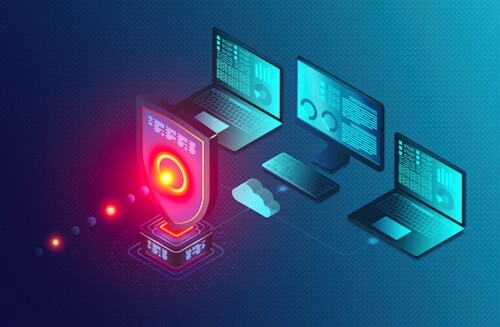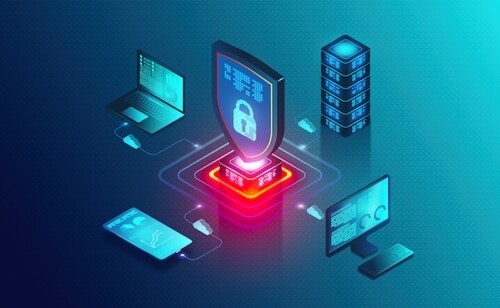5 Steps to Implement Vulnerability Management into your Business
Discover how you can implement vulnerability management into your business with our useful guide.
According to a Ponemon Institute study, 68% of organisations have experienced one or more endpoint attacks that successfully compromised data and/or their IT infrastructure.
Read on to learn more about endpoint protection as a solution to cybersecurity threats.
An ‘endpoint’ refers to technology such as desktops, laptops, and mobile devices that can — if compromised — create unwanted entry points to a company’s network. These entry points can easily be compromised if a cybercriminal or malicious insider comes across them undefended.
Endpoint security, then, is the practice of securing these entry points or endpoints.
Once upon a time, endpoint security was as simple as installing traditional antivirus software. But nowadays, as the complexity and destructiveness of cyber threats have developed, endpoint security involves a much more sophisticated protection strategy against malware and viruses.

Endpoint protection usually takes the form of a combined approach between EPP (endpoint protection) software and a team of trained software specialists to monitor a business’s endpoints. A good EPP software will often make use of the following:
However, the main method of endpoint security is to create a centralised platform for all key players and administrators to monitor a business’ systems, detecting cyber threats before they develop into something serious, and isolating them before they cause damage.
Regardless of the size of your business, or the sector you operate in, endpoint protection should be on your list of IT must-haves. Simply put, if your business is online, it’s at risk from cybercrime. So, let’s examine just a few reasons why endpoint security should be considered essential for all businesses.
To risk stating the obvious, endpoints are obvious targets. Contrary to the name, for cybercriminals, endpoints are usually the starting point when it comes to gaining access to an organisation’s systems.
However, in recent years, businesses have had to contend with an increasing number of endpoints thanks to current working trends such as hybridity and BYOD (Bring Your Own Device) schemes.
As businesses expand and change with the times, so too do the number and type of endpoints. Remote working makes perimeter security increasingly difficult for organisations. Think about it like this — the larger the perimeter of a fence, the more likely it is that (virtual) ‘holes in the fence’ go undetected for longer.
As a counterpart to increasing endpoint numbers, cyber threats themselves are on the up too. Statista’s Cybersecurity Outlook estimates that the global cost of cybercrime will rise from $8.44 trillion in 2022 to $23.34 trillion by 2027.
As the amount and severity of cybercrime against individuals and businesses rise, so does the sophistication of said threats, advancing the need for more complex endpoint security systems. As such, more and more businesses are realising they cannot do this alone and are recruiting cybersecurity experts like ITRM to assist their defence against the worsening threat landscape.

A lack of a coherent endpoint protection strategy leaves your devices, systems, networks, and data exposed. Since more and more data is stored online in cloud-based systems, data losses and breaches are becoming fatal for businesses.
Not only could an endpoint breach cause essential data to be lost (and not recovered if you don’t have an effective backup procedure in place). But lost data could easily fall into the wrong hands, putting clients, stakeholders, and staff at risk.
What’s more, on the whole, data loss always dents an organisation’s reputation, and it takes a while for customers to trust a business with their information again.
Here at ITRM, we have an endpoint security solution of our own.
Under our ITRM Protect package, our cybersecurity experts can monitor and protect three core areas of your business against data breaches:
Our experts can consistently monitor your systems to ensure that no virus, spyware, or malware can infiltrate your company’s systems. We operate via a cloud-based platform, making the most of machine learning to take context and reputations into account to prevent threats (even never-before-seen) across:
Head to our IT security service page to learn more about our ITRM Protect and ITRM Secure packages.
If you have any further questions about our endpoint protection services, or you’d like to find out more about the levels of digital protection your company needs, get in touch with our experts today.
In the meantime, for more strategic IT business insights, be sure to keep up with our blog.

Discover how you can implement vulnerability management into your business with our useful guide.

In this blog, explore the current cyber threat landscape, why charitable organisations are at risk and how to protect your charity/not-for-profit so you can continue your mission...
By clicking “Accept all cookies”, you agree ITRM can store cookies on your device and disclose information in accordance with our Cookie Policy.
When you visit any of our websites, it may store or retrieve information on your browser, mostly in the form of cookies. This information might be about you, your preferences or your device and is mostly used to make the site work as you expect it to. The information does not usually directly identify you, but it can give you a more personalized web experience. Because we respect your right to privacy, you can choose not to allow some types of cookies. Click on the different category headings to find out more and manage your preferences. Please note, blocking some types of cookies may impact your experience of the site and the services we are able to offer.